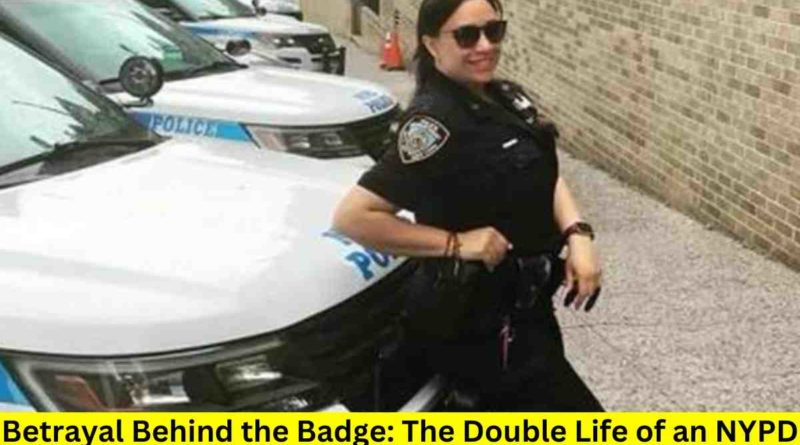Betrayal Behind the Badge: The Double Life of an NYPD Veteran
What happens when the guardians become the violators? The streets of New York were rocked with a scandal straight from a crime novel, as a veteran NYPD officer, who outwardly expressed pride and dedication to her job, was federally charged for allegedly dealing dangerous narcotics—specifically, fentanyl and heroin—while serving on the force. Could anyone fathom that an officer sworn to protect the community could lead such a dangerous double life? This bombshell dropped, leaving the citizens of Yonkers and the entire nation grappling with betrayal and disbelief. The alleged criminal activities of this officer, who once boasted about her love for her noble profession, have tainted the image of law enforcement, sparking conversations about ethics, responsibility, and the very fabric of societal trust.
Who Guards the Guardians? The Crumbling Trust
The Thin Blue Line: Walking Between Duty and Crime
How does one who upholds the law by day fall into the shadows of criminality by night? The unravelling of this officer’s activities offers a glimpse into a life led on edge, teetering between the responsibility of the badge and the lucrative lure of the underground drug trade.
Public Distrust: The Ripple Effect on Community Relations
When those designated to safeguard public welfare are caught in nefarious deeds, it inevitably erodes the community’s trust. This incident has fanned the flames of ongoing debates about police accountability and reform, underscoring the urgent need for transparency and integrity within the ranks.
Fentanyl and Heroin: A Deadly Business
The Opioid Crisis: Understanding the Impact
The officer’s choice of trade wasn’t just illegal; it was deadly. Fentanyl and heroin have been ripping through the fabric of our society, contributing to the opioid epidemic that claims thousands of lives annually. What does it mean when those who should serve and protect contribute to the crisis?
‘Top Quality’ Drugs: The Irony of the Trade
The term ‘top quality,’ used to describe the lethal products the officer was allegedly peddling, is chilling. It highlights the stark contrast between her obligation to preserve life and her reported involvement in a trade that relentlessly extinguishes it.
The Allegations: An In-Depth Look
Federal Charges: Where Law Meets Justice
Facing the music, the officer is now under the federal microscope. The charges laid are severe, reflecting the gravity of betraying a position of public trust for personal gain. How will the justice system balance this act of ultimate societal betrayal?
Evidence and Investigation: Beyond Reasonable Doubt?
Building a case of this magnitude requires meticulous effort. It’s not just about proving the act; it’s about unequivocally establishing the breach of ethical duty. What evidence have federal authorities gathered, and how might this influence the public’s perception of law enforcement’s integrity?
Repercussions Within the Ranks: NYPD in Focus
Internal Reckoning: When One’s Actions Reflect on All
The accused officer’s actions have inevitably cast a shadow over her colleagues, prompting an internal reckoning within the NYPD. How will this incident shape recruitment, training, and the internal culture moving forward?
Addressing the Rot: Measures by Law Enforcement Agencies
Instances like these force a mirror upon law enforcement agencies, compelling them to introspect and reform. What measures have the NYPD and other agencies implemented to ensure such a breach of trust doesn’t recur?
The Community Speaks: Public Reaction and Impact
Outrage, Disbelief, and Distrust: The Public’s Verdict
The citizens’ response was a mix of outrage, disbelief, and a deep sense of betrayal. How are communities coping with this incident, and what are their expectations for future policing policies?
Community Healing: Restoring Faith in the System
Rebuilding trust is a monumental task. It requires concerted efforts to heal community relations and restore faith in the system that promises to protect and serve. What steps are community leaders and law enforcement agencies taking in this direction?
FAQs: Addressing Public Queries
- What specific charges does the officer face?
- The officer is facing federal charges related to drug trafficking, specifically dealing in fentanyl and heroin, while on duty.
- How did federal authorities uncover this double life?
- Detailed investigative work led to the allegations, including surveillance, undercover operations, and the use of informants within criminal networks.
- What are the potential consequences if the officer is found guilty?
- If convicted, the officer faces serious repercussions, including a lengthy prison sentence, mandatory fines, and the permanent loss of her career in law enforcement.
- Has the NYPD implemented measures in response to this incident?
- The NYPD reportedly takes this breach seriously, reviewing internal policies and enhancing measures to prevent such incidents.
- What role can the community play in rebuilding trust with the police?
- Community engagement, collaborative reforms, and open dialogues with law enforcement are crucial in re-establishing trust and improving accountability.
- Are there resources for those affected by the opioid crisis?
- Numerous resources are available, including local support groups, national helplines (SAMHSA), and treatment facilities.
Conclusion: A Path Forward Amidst Betrayal
The case of the veteran NYPD officer accused of such grave violations stands as a stark reminder of the complexities within our societal structures. It’s a story of crime and betrayal and a call to action for law enforcement and the public to forge a path toward restored trust and reformed practices. The road ahead is undoubtedly challenging, but it is only through facing these adversities that society can hope to emerge more substantial, with a more resilient and just system in place.
